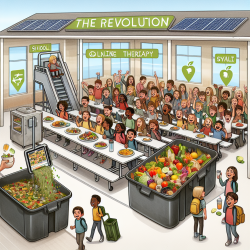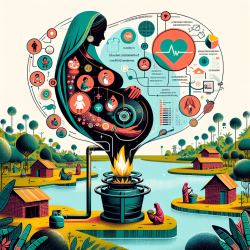Introduction
In the realm of educational institutions, cafeterias serve as more than just a place for students to grab a meal; they are a fertile ground for learning and implementing sustainable practices. The research article "Poised for Change: University Students Are Positively Disposed toward Food Waste Diversion and Decrease Individual Food Waste after Programming" sheds light on how educational programs can significantly reduce food waste in school cafeterias. This blog will explore how practitioners can leverage these findings to enhance their skills and encourage further research in this vital area.
The Power of Programming
The study highlights the "No Scrap Left Behind" program, which was developed to educate students about the impacts of food waste and encourage them to take actionable steps to reduce it. The program's success is evident, with a reported 28% decrease in food waste per student in the first year and a 26% reduction in the subsequent year. These results underscore the potential of educational interventions in transforming student behavior and attitudes toward sustainability.
Implementing Change in School Cafeterias
For practitioners aiming to replicate this success, consider the following strategies:
- Interactive Learning: Engage students with interactive activities such as food waste buffets and quizzes to make the learning process engaging and memorable.
- Visible Impact: Display food waste data prominently in cafeterias to increase awareness and encourage students to participate in waste reduction efforts.
- Behavioral Nudges: Implement subtle changes in the cafeteria environment, such as reducing plate sizes or offering tray-less dining, to naturally decrease food waste.
- Tailored Messaging: Customize educational materials to resonate with the specific student population, emphasizing the economic, environmental, and social impacts of food waste.
Encouraging Further Research
While the "No Scrap Left Behind" program has shown promising results, further research is essential to understand the long-term impacts of such initiatives. Practitioners are encouraged to explore questions such as:
- How can food waste reduction programs be adapted for different educational settings?
- What are the long-term behavioral changes in students exposed to these programs?
- How can technology be integrated to enhance the effectiveness of food waste education?
Conclusion
Educational programs like "No Scrap Left Behind" demonstrate the significant role that schools can play in fostering sustainable practices. By implementing these strategies, practitioners can not only reduce food waste but also instill lifelong habits of sustainability in students. For those interested in delving deeper into the research, the original paper provides a comprehensive overview of the study's methodology and findings.
To read the original research paper, please follow this link: Poised for Change: University Students Are Positively Disposed toward Food Waste Diversion and Decrease Individual Food Waste after Programming.










